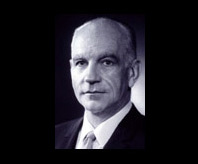Steroid Hall of Shame | Balco Timeline | Steroid Timeline | Mitchell Report




Home Page
Steroid Overview
Steroid Timeline: From Germany to USA
Commissioners and Controversy
- Kenesaw Landis
- Albert Chandler
- Ford Frick
- Colonel Eckert
- Bowie Kuhn
- Peter Uberroth
- A. Bartlett Giamatta
- Francis Vincent
- Alan Selig
Balco Timeline
Mitchell Report (409 pg pdf)
2002-06 Collective Bargaining Agreement (pdf)
2007-11 Collective Bargaining Agreement (pdf)
General William D. Eckert
Fourth Commissioner of Major League Baseball
1965-1968
The five-year interval 1963-1968 was one of rampant growth in the use of performance-enhancing steroids and associated drugs within both the U. S. amateur and professional levels. It was regrettable that, in 1965, major league baseball had to undergo the turmoil associated with the selection of a new commissioner.
The baseball owners compiled a list of candidates for the position of commissioner, including long-term baseball men Joe Cronin, Lee MacPhail, and Gabe Paul. Although these three candidates were considered well-qualified for the job, the owners ultimately decided that each had too many enemies — a factor that might make them ineffective. At that point, deciding to reach outside of the baseball establishment, the owners looked to retired four-star Army General William D. Eckert, who had been highly recommended by no less a personage than Air Force General Curtis LeMay, the so-called "Father of the Strategic Air Command." The owners unanimously elected Eckert as baseball's fourth commissioner in November 1965, a decision they would soon come to deeply regret.
During his term of office, General Eckert "distinguished himself" by: • Failing to acquire a sense of the inner workings of major league baseball (he had not even attended a game in over 10 years)
• Refusing to cancel major league baseball games in the immediate aftermath of the assassinations of Robert Kennedy and Martin Luther King Jr.
• Failing to demonstrate the business acumen or legal savvy to protect major league baseball's best interests in his dealings with Marvin Miller, Executive Director of the newly-created Major League Baseball Players Association, especially regarding the first collective bargaining agreement between the players and the owners (1968)
Eckert resigned in 1968 — midway through his expected tenure — recognizing that the baseball owners had lost all confidence in his ability to competently administer major league baseball. It was a woeful ending for this West Point graduate, Harvard MBA, and high-ranking Army officer.
During the time it was grappling with Eckert's incompetence, major league baseball lost valuable opportunities to be proactive in securing the game's integrity vis-a-vis the threat of increased steroid therapy. During his watch, Eckert failed to act in the face of such profound indicators as:
• The International Olympic CommitteeÕs banning of the use of steroids in International Olympic events
• The pre-Olympic use of steroids by runners, jumpers, and many other track and field athletes in preparation for the 1968 games in Mexico City
• The undisguised advance in the use of steroids at both the U.S. amateur and professional levels
Looking back, the baseball owners' appointment of General Eckert as commissioner was a mistake. The mistake didn't lie in the General's leadership ability; the core problem may have been that Eckert simply lacked the baseball-specific qualifications needed to run the show. At the very least, the baseball establishment seemed to learn from its mistake, as evidenced by its subsequent selection of Bowie Kuhn as Eckert's successor. Kuhn did well enough to serve for 15 years, but that's another story.
This website & Syringe Logo are owned and copywritten by Allan Doherty 2006 - 2009.